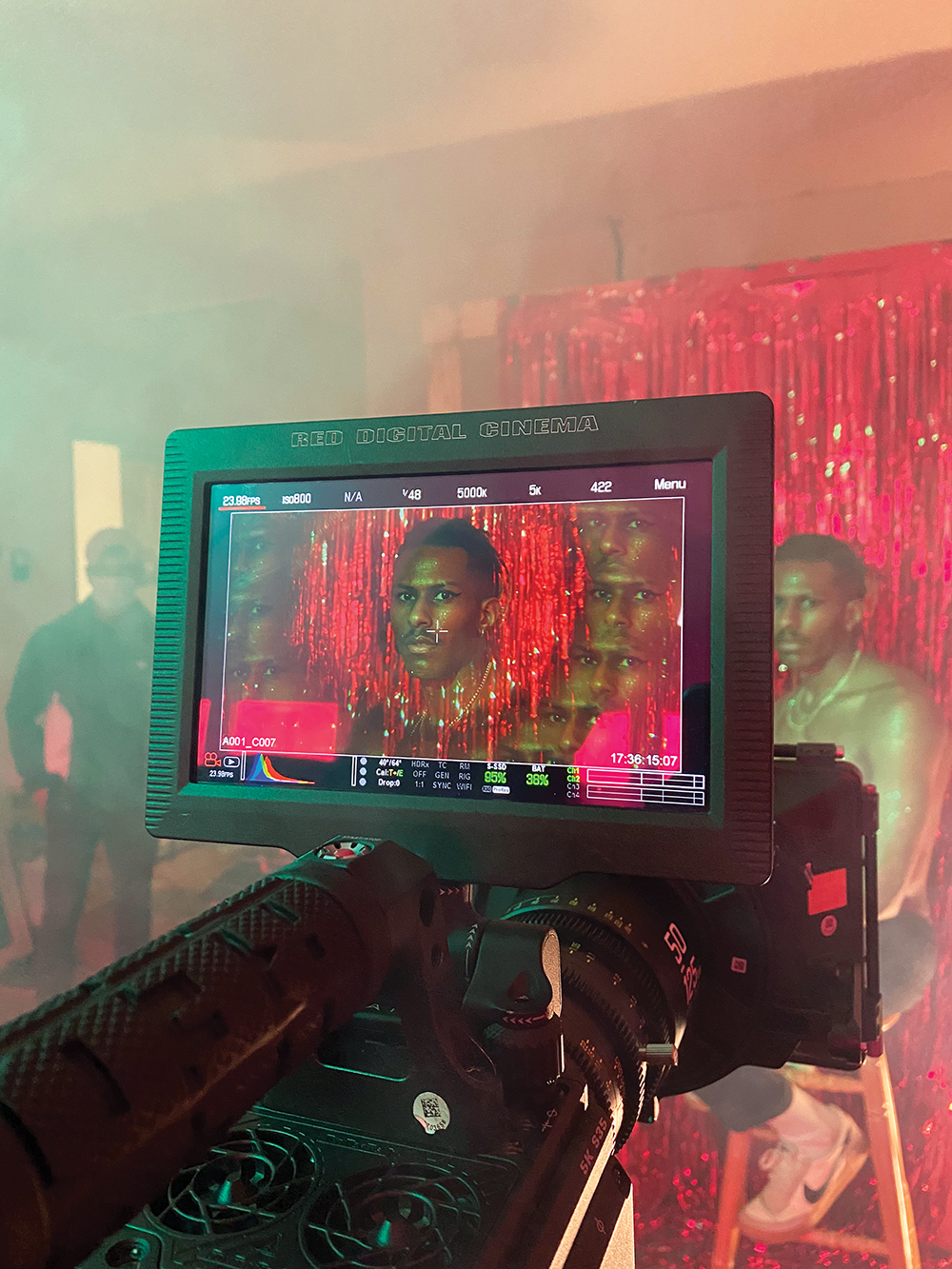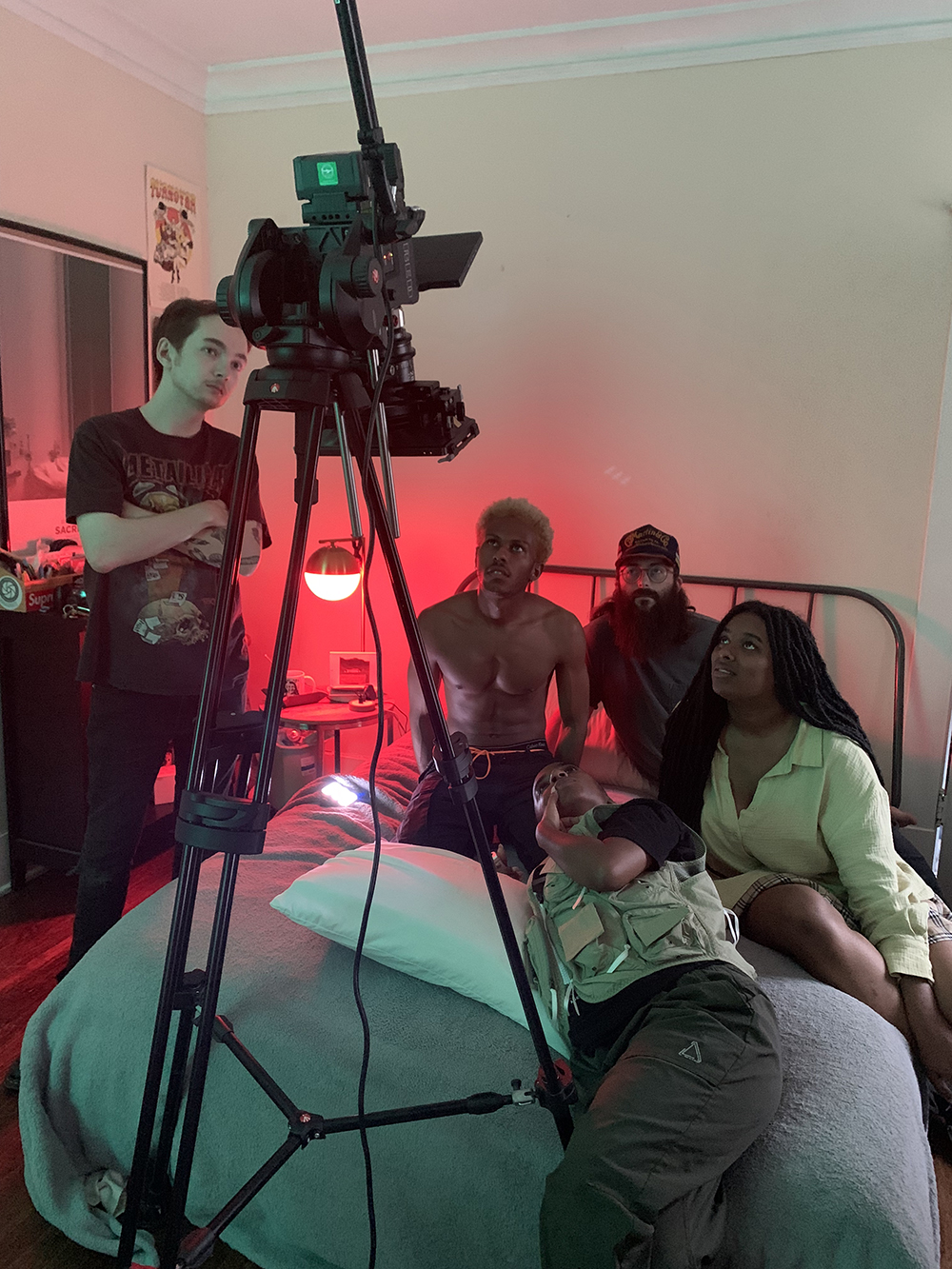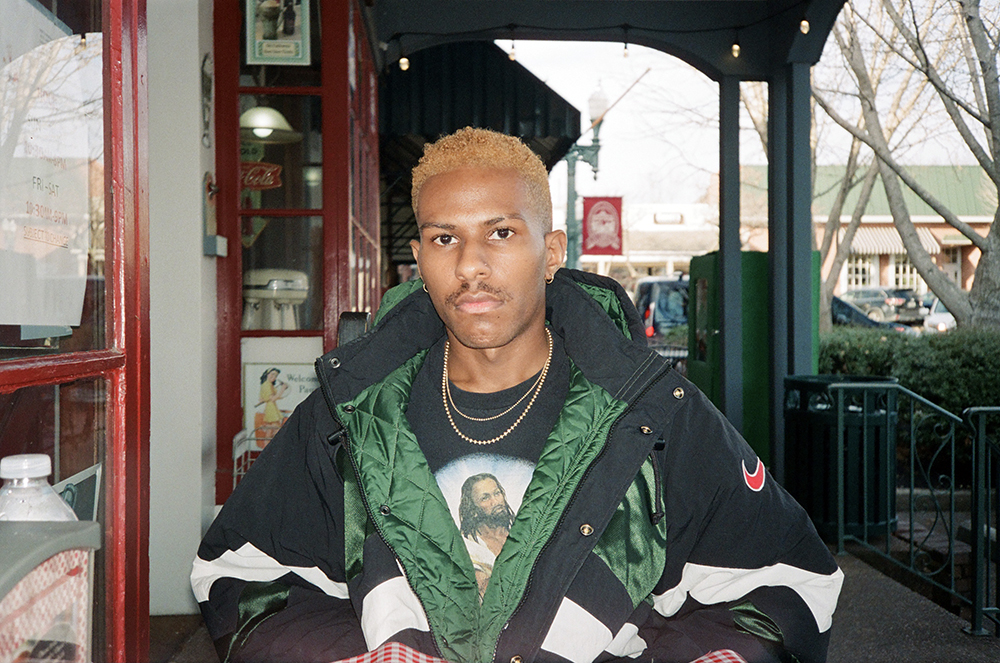Stumbling Into Greatness
Turning a corner, producer/engineer Matt Ross-Spang had no idea what he was walking into. None of us did back in late November 2019, though that marked the birth of a certain spiked virus that would change all of us. That was a world away when Ross-Spang heard the murmurs from a show already in progress, and he walked in. “The Green Room in Crosstown Concourse has caused me to see a lot more live music, with how easy it is to sneak over there after work. So I walked in and was immediately blown away. A string quartet was out in front, and the singer was behind them, hiding a little bit. There was a light projector and two or three screens with video going on. There was this amazing visual aspect to the show, and he was using two different vocal microphones with different effects for certain parts of the song. I immediately was struck by the cinematic and genre-bending music and lyrics I was hearing. And I noticed the crowd. Every walk of life was in there: old, young, Black, white.”
The singer in question was Lawrence Matthews III, but the artist on the bill was Don Lifted. They’re one and the same, of course, or are they? After all, there were two microphones, two voices. And at that point, having already self-released two albums, Matthews didn’t know if Don Lifted would be around much longer. “I was putting out the energy that I was not going to continue doing what I was doing,” Matthews muses in his soft-spoken manner, as we sit in the hushed environs of the Memphis Listening Lab. “I felt like I was at the end of what that body of work was. I was just not where I wanted to be.”
Nonetheless, he booked a modest national tour, a last hurrah perhaps, with The Green Room show right in the middle of it. “And I had this moment where I was like, ‘Damn, I’m halfway through this tour and nothing’s happening.’ I went on the tour to close the Don Lifted thing down, but also 50 percent of you is like, ‘I would love for something to happen.’ I’m traveling across the U.S., driving to San Francisco, going to L.A., going to New York. I would like for something to happen if this is going to continue being a thing.”
Any artist would feel such ambivalence if their first two albums matched the quality of Don Lifted’s. Rooted in hip hop’s rhythmic rhyming, but including elements of shoegaze rock and even smooth R&B, both revealed the artist’s fine sonic craftsmanship, limning the growing pains of his late teens/early twenties with equal parts hindsight and poetic furor. In both Alero and Contour, named for the respective cars he drove in those pivotal moments of his life, he crafted subtle, moody soundscapes over which his lyrics flowed like incantations. And from the start, he took great care with the presentation of his music. As he told the Memphis Flyer in 2017 when performing his Alero material with Blueshift Ensemble at the Continuum Music Festival, “I graduated with a painting degree [from the University of Memphis]. But I also did photography, sculpture, painting, drawing, ceramics. I don’t do shows unless I can do a self-curated event in an alternative space. And I try to completely transform the space. So you might come into a space and see three projections, all in sync with the music. I’m just trying to curate a whole experience.”
When Ross-Spang walked into his show two years later, he was still at it, with much critical acclaim but only middling sales and no record deal. “After The Green Room show, I literally had just had that thought of, ‘Damn, something has to happen between San Francisco and L.A.’ Those were the next two stops on my tour. ‘Something’s gotta happen, dawg.’ And then my phone started going ping ping ping ping! I looked, and it said, ‘Fat Possum [Records] has followed you.’ And then I got an email from my manager saying, ‘They want to meet with you.’ And I was just like, crying in the car.”

“Pick How I’m Moving”
Matt Ross-Spang, it turned out, was beginning to spread the word. “I thought I would be remiss if I didn’t tell my friend Bruce Watson about him,” he recalls of his talk with the co-owner of Fat Possum. “The very next day after the show, I called Bruce. I never do that, really, but I was pretty blown away. So I told him, you should check this guy out. He doesn’t sound like anybody; he’s hard to pigeonhole. He’s really young, but he’s already figured so much out, and he’s working his butt off. And he checks all the boxes of what you’re looking for in an artist.”
After that, Matthews recalls, “The higher-ups at Fat Possum and I had a meeting that was dope. They all had different goals in the conversation, and I was trying to balance it. As someone who has not talked to record label people regularly, I was like, ‘What’s happening?’ They wanted to know, like, ‘You haven’t released anything since 2018, what are you up to?’ So I wrote and recorded ‘Golden (The Wait)’ that week and gave it to them. And the energy I have in that first verse is like, ‘This is who I am. And this is why I am here. Fuck with me.’ And they were like, all right, let’s do it.”
Pick how I’m moving
Pick who I’m choosing
The product is soothing
I pray to God that he Fluid
Flow how the way I be moving
Cut to 2021, and the imminent release of Don Lifted’s new album on the label. It’s an apotheosis of sorts, not only solidifying the artist’s reputation as a performer with staying power, but Fat Possum’s ongoing reputation as a home for music that is beyond category. While the Mississippi-based imprint has featured other hip hop-leaning artists like MellowHype, Patrick Paige II, and El-P, it appealed to Matthews precisely because of its eclecticism.
“My approach with Fat Possum has been very much like, ‘Let’s not treat me like a hip hop artist.’ I’m liable to put out some of anything, so I try not to go through some of those traditional hip hop outlets, as I navigate the music industry. It’s still weird. I’ve been called alternative, indie rock, rap, even R&B from one publication. Everybody wants to genre you. I don’t know what it is, to be honest [laughs]. I was trying to get them to just call it a pop record.”
Indeed, that may be the most apt way to describe the album 325i, to be released October 22nd. Once again named after the car he drove during events that inspired the songs, it’s notable that a BMW 325i is Matthews’ current ride, carrying him through recent times. This marks a new territory for the songwriter: the here and now.
In the Moment
“My previous works were built on reflection,” says Matthews. “Alero and Contour were both me going back five years, seven years, to reflect about a time, to build it and put it together and create a narrative and a timeline. This one feels more evolving throughout because I’m changing as life is changing me. I’ve had very large transformative changes working on that project, but also how I see the world, how I see myself within the world, how I see everything. Everything is completely changed. By the end of the record, I’m a completely different person with a completely different perspective and style than I had when I wrote ‘Golden.’”
Of course, one reason for that is the timing. “Golden (The Wait),” which kicks off the new album, was the only track written in the relatively innocent last weeks of 2019. “Fat Possum liked the record,” Matthews recalls. “And they had me come down to Oxford and I signed in March 2020. A week before the shutdown.”
Even for those who survived the spread of Covid-19, the isolation and anxiety of 2020 was a long, dark night of the soul. It was no different for Matthews, and, as he describes it, 325i, recorded in his home over those months, is the ultimate chronicle of that interior journey. “There were points where my anxiety was so crazy because of Covid, the election, the shootings. Everything that was happening,” he says. “I thought, ‘I may not make it to the end of this record.’ That was a serious anxiety of mine. I just stayed in the house, not just because of Covid, but because I didn’t want to end up dead.
“A lot of people died. I think that’s something we don’t really want to talk about. So I had a lot of anxiety, and you can hear it in the record. You can hear a lot of fear and unsureness in the record. But by the end, there’s also this realization of some kind of peace within the thing. So you work however many years, you receive this thing that allows you to pursue your art at a level you haven’t done before. This hasn’t been an opportunity provided to most folks from the scene that I came from. Anybody who’s transitioned on to higher aspirations has moved. I stayed. I got this deal. A week later, the world goes insane and stays insane.”
And yet, 325i is not a “news of the world” experience. The upshot of quarantine, for Matthews, was living in close quarters with those nearest and dearest to him. “I was spending a lot of time in the house with my loved ones and writing about very personal, intimate experiences. There’s so much going on in the world right now, but I didn’t want to put a protest album out. I wanted to challenge myself: How do I write about how bad things are right now without directly telling you how bad things are right now? I want you to feel how bad it is out here.”

Reach Out from the Inside
And by “out here,” Matthews actually means “in here.” The album comes across as a very interior journey, between contradictory impulses to have loved ones see your full self, even as you fear to reveal it. “In what scenario are you longing for a person you can’t interact with?” Matthews asks. “Lockdown. You’re closed in with a person. You have an issue. You have to work through that. You’re in it together. In the past, when you could run from it, you maybe wouldn’t want to dig into certain insecurities and fears you might have with a partner. But this is the time. If we don’t deal with it now, we’ll never deal with it. So those moments inform that body of work, and there is this overall dread of that in the background.”
Yet it’s a dread mixed with the determination to unpack one’s self. As Matthews notes, “There’s a series of lines on ‘Darla’ which essentially say, ‘I don’t know how to do this.’ A lot of us are products of divorce and failed marriages and weird family things, and now, getting older, I’ve realized, ‘Wow, I don’t have any proper examples of this stuff.’ You really have to relearn how to love somebody, not based on how you’ve been taught to love folks. ’Cause I’ve got a whole series of lines that go: ‘I don’t know no way, so I can’t make my own.’ Basically, ‘I’ve never seen nobody do this right, so I don’t know how to do it. Nobody ever held my hand, so I can’t hold no hand.’”
In the restless imagination of Matthews, all these interior reflections ultimately lead back to the world at large. He began with a challenge: How can an artist evoke the spirit of troubled times without simply describing the world as it is right now? And even now, he keeps returning to the political within the personal, the soul as an expression of the world’s corruption. It’s a natural extension of his art in general, both in his photographic work, grappling with topics as diverse as Black masculinity or gentrification, or his work with the Black arts nonprofit Tone, for whom he is the gallery director. An awareness of the wider forces around us informs even the most intimate moments of 325i.
“I have to make my own way,” he muses. “Everything I was taught about going to college or getting married, or doing this or that, wasn’t working. I think of 2020 as a year of ‘Yeah, all this stuff we’ve been taught does not work.’ It’s a complete travesty. It’s collapsing around us. Everything that’s dealing with humans is crumbling in front of our face and we see how sorry our infrastructure is. And people just think about that as a government or politics thing, or a healthcare thing. It’s all of that and how we are taught to love each other. How we are taught to show up for each other. ’Cause last year we saw the most insane selfishness, and still are seeing it to this day. People don’t really give a shit about other people. And we’re finding that out in real time, watching history unfold in front of our eyes, and seeing people making conscious choices not to take care of their grandparents, their children, folks around them, their loved ones, to risk things, to literally risk death to … go eat at Chili’s. See what I’m saying? It was like, ‘Oh wow! We don’t know nothing!’”
Taking a breath, he turns his eye inward. “Hey, I myself have not been taught this stuff. I need love, I want love, but sometimes it feels like I’m not capable of giving it. And here are all the reasons why — I need you to work with me. That’s a tough thing to admit. A lot of guys, a lot of people, just try to pretend that they’re like some hard-shelled individual, closed off from other people. The reality is, you wanna be loved just like everybody else. You’re just scared of what that means.”
